Is the Farm Stop Revolution Upon Us?
A hybrid between a farmer’s market and a co-op store, farm stops are popping up across the country, helping customers access local food year round.
Is the Farm Stop Revolution Upon Us?
A hybrid between a farmer’s market and a co-op store, farm stops are popping up across the country, helping customers access local food year round.

Local Roots Farm Stop.by Betsy Anderson.
In 2008, Jessica Eikleberry was 29 years old and had just read Michael Pollan’s Omnivore’s Dilemma. She wanted to start eating locally and, with the help of her mom, she made a goal for the coming Thanksgiving: an all-local meal.
Eikleberry was shocked at how difficult it was for her to source local ingredients. She lives in Wooster, a productive agricultural area that hosts Ohio State University’s Agricultural Research and Development Center. Yet, even surrounded by farmland, they were “chasing a turkey all around Ohio,” Eikleberry recalls. Eventually, the family succeeded in finding their local fare. They enjoyed it so much that they wanted others in the area to have the same opportunity to cook with local food but without the hardship of tracking it all down.
Soon after, they got word of another conversation happening in Wooster. Betsy Anderson, who worked for OSU’s Ohio Agricultural Research and Development Center—along with her family—had been dreaming of some kind of cafe combined with a market for local food. They had approached county commissioners with their idea, but it hadn’t progressed beyond that.
The two groups joined forces, meeting once a week, building support, attracting others interested in helping. By January 2009, they had formed a board and incorporated as a member-owned cooperative that June, striking a deal with the Wayne County commissioners to take over a run-down building and transform it into a one-stop farm shop.
In May, 2010, the new store hosted a celebratory grand opening. Over a cheerful green-striped awning and generously windowed storefront, the hand-made sign welcomed shoppers into Local Roots Market & Cafe—the nation’s first year-round, everyday farm store selling local food on consignment. Vendors would set their own prices; when items sold, they’d get a percentage of the sale price returned to them in two-week payouts. It was a new store—as it turned out—that would launch a movement.
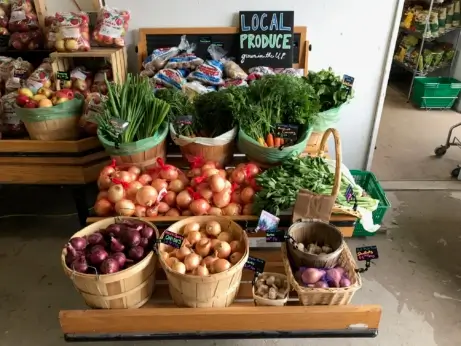
Funding the farm stop
The local food movement has always struggled with the conflicting values of paying farmers fairly without making food an elite commodity. In addition, it can be hard for customers to source food year-round, depending on where they live, and modern grocery stores have conditioned many people to expect fresh strawberries in January or pumpkins in June. Farmers markets are great, but many run only certain days of the week or months of the year. Enter farm stops.
Farm stops are a hybrid of these models. With brick-and-mortar locations, they are open year-round for customers, and they allow multiple farmers to sell their goods at the same time. Most farm stops work on consignment, where farmers set the prices for their goods, and the farm stop takes a cut of the profit—generally about 30 percent. All farm stores also rely on wholesale purchases to fill out inventory with items that producers are unwilling to sell on consignment.
But farm stops, like any other venture in the food and agriculture space, can struggle with tight profit margins. Some stops are experimenting with pricing to ensure profits can stabilize. Food access is a primary concern at FARMacy Community Farmstop in Rock Hill, SC, where founder Jonathan Nazeer is trying something new.
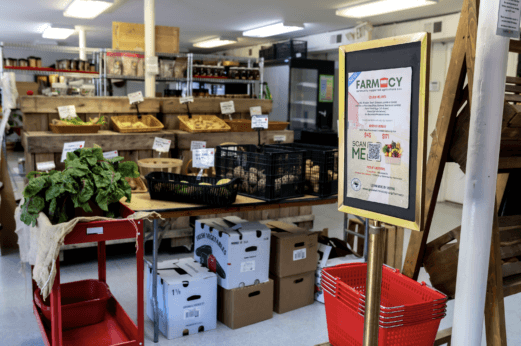
He estimates that 70 percent of his customers are higher-income shoppers from surrounding neighborhoods who drive out of their way to support his store because they are, as he understands it, “motivated by the mission of bringing good food into what they know has been a community marginalized for decades.” The support has been critical. Not yet able to accept SNAP benefits, FARMacy prices were out of reach for many living in the immediate vicinity of the store.
To reach this community, FARMacy adopted a pay-what-you-will system. Select products are labeled with their “real-value” price—what farmers expect to get from those sales—but customers can pay whatever they choose. There’s a balancing act that relies on customers who can pay more than the posted value choosing to do so. The data collection is on-going, but Nazeer is happy with the response he’s seen so far—a 37-percent increase in shoppers from the immediate community. Grant money subsidizing the program from the USDA’s Local Food Purchase Assistance Cooperative Agreement Program is set to run out in June 2025, but Nazeer recognizes that “pay-what-you-will” was never a sustainable solution to the root challenges of food sovereignty, which is his primary concern.
“If communities are not working towards producing their own food, then they have to rely on other communities to do that. I think each community has to be independent when it relates to food,” he says, reflecting on the difficulty he’s had convincing South Carolina farmers to sell on consignment in his community. Working with several South Carolina-based partners, Nazeer has launched Crop Hill to establish an urban agricultural district.
Some founders of farm stops have relied on personal finances to acquire initial building space. Most others, as with Local Roots, have been given deals on municipally owned buildings. Keller Market House paid $1 for the title of a county-owned land bank building in Lancaster, Ohio. A gas station, owned and renovated by the town of Jonesborough, is leased, according to its executive director Lori Powell, “at a very low rate” to Boone Street Market in Tennessee.
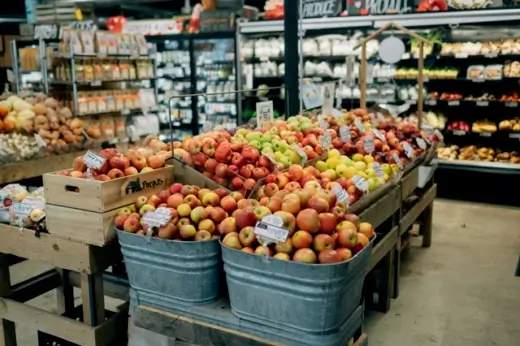
Fellowship of the farm stops
Over the first three unseasonably warm days of March, 2024—15 years after the founding of Local Roots—a first-of-its-kind conference was held at the University of Michigan’s Matthaei Botanical Gardens.
Kathy Sample and Bill Brinkerhoff—co-founders of Argus Farm Stop in Ann Arbor, Michigan—wanted to take stock of what they recognize as a movement, one that they’ve helped to accelerate.
They tasked Argus manager Casey Miller with finding and inviting everyone associated with year-round consignment farm stores in the country, from those in operation to those in the inkling or development stages. The result was the 2024 Farm Stop Conference, which gathered 130 attendees from across the country, including representatives from all levels of government, several NGOs and half of the 14 recognized farm stops.
Brinkerhoff recounted to the gathering the couple’s discovery of Local Roots in 2013. They were dropping off their son, Ben, at the College of Wooster when they happened upon the store and were enthralled.
In November 2013, they began a detailed feasibility study to determine if and where a Local Roots-style store might work in Ann Arbor. Later that winter, they arranged a behind-the-scenes Local Roots visit to shadow employees and learn the nitty-gritty of the business. They were hosted by general manager Jessica Eikleberry.
In March 2014, Sample and Brinkerhoff signed a lease for a former gas station situated along heavy commuter routes—car, bicycle and walking—on the edge of downtown Ann Arbor. The business opened later that summer as a low-profit, limited-liability social enterprise, including a small coffee shop that helps fund operations. They opened a second shop across town in 2017 and expanded that into an adjacent building in 2022.
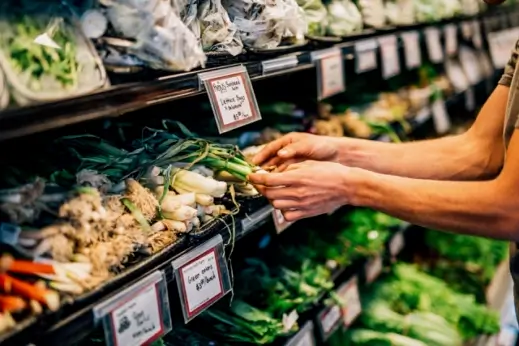
Last year, sales at these stores topped $6.5 million, two-thirds of that from sales of grocery items and the rest from cafe sales. Argus’ top 12 earners in 2023 saw more than $100,000 in sales and included seven farms selling vegetables, fruit, meat and dairy, along with two bakeries and a prepared-food vendor. But even smaller or limited season operators fared well: 75 vendors—half of them farmers—made more than $10,000 in sales. In its first decade, Argus has paid out more than $20 million to its vendors.
Brinkerhoff is passionate about the mission and the need for these kinds of stores. At the conference, he projects an image of a partitioned dollar bill from the USDA’s Economic Research Service showing that for every dollar consumers spend in a grocery store, a bit less than 15 cents went to the farmers producing the raw ingredients.
Tom Zilke, owner of Zilke Vegetable Farm, has been selling produce from his 25-acre farm through Argus since they opened. He describes selling through Argus as “very easy. The big benefit is they’re doing the selling. We come straight from the farm, drop it off and walk away.”
With Argus’ 70-percent consignment rate, Zilke will get 70 cents on the dollar when his products sell, without time and labor costs of manning his on-farm farm stand or a farmers market tent.
Katie Barr has thought a lot about farm stops. She literally wrote the book on How to Start a Farm Stop as part of her Master’s thesis for the University of Michigan’s School for Environment and Sustainability. As she discovered, the establishment of a farm stop can result in profound and sometimes unanticipated benefits for farms and food systems. Interviewing more than 40 farmers who sell through farm stops, Barr documented numerous stories of farmers paying off debt and investing in critical infrastructure—including additional acreage, greenhouses and root cellars—and expanding or investing in entirely new production systems. One farmer shifted their operation to winter production in order to take advantage of their farm stop’s need for winter produce. Another farmer made enough money selling eggs and chicken that they were able to establish a goat herd and, eventually, a flock of sheep to add goat milk products and wool to their repertoire.
The science of ecology has a truism: In the face of disturbance, diversity confers stability and resilience to the biosphere. Perhaps the same holds true for food systems.
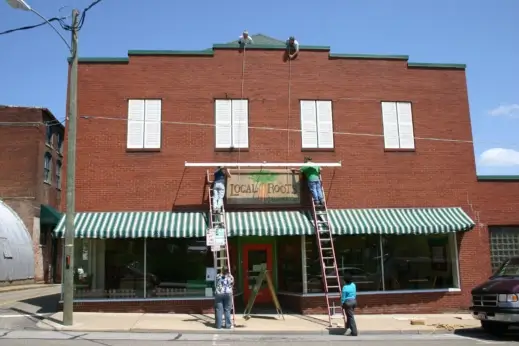
Thinking of starting a Farm Stop? Here are some resources:
Get the book How to Start a Farm Stop by author Katie Barr. Purchase the book or find a free downloadable PDF at this link.
Argus Farm Stop offers online training workshops on starting a farm stop or an online market here: https://www.argusfarmstop.com/learn
You can also visit these farm stops. Know of others? Share your favorite farm stop in the comments!
Local Roots Market and Cafe in Wooster, OH
The Wild Ramp in Huntington, WV
Argus Farm Stop in Ann Arbor, MI
Boone Street Market in Jonesborough, TN
Agricole Farm Stop in Chelsea, MI
Keller Market House in Lancaster, OH
FARMacy Community Farmstop in Rock Hill, SC
Lakeshore Depot in Marquette, MI
Random Harvest in Craryville, NY
Bloomington Farm Stop Collective, Bloomington, IN
Philmont Cooperative in Philmont, NY
Public Market in Wheeling, WV
East Lansing Food Co-op in Lansing, MI
South East Market in Grand Rapids, MI
Meadowlark Market & Kitchen in Lander, WY
Foodsphere is The Entrepreneurial Center of Local Roots
Purplebrown Farm Store, in Peninsula, OH
Lowe Creek Farmer’s Market, in Prospect, KY
Liberty Prairie Farm Store, in Grayslake, IL
Follow us
This work is licensed under a Creative Commons Attribution-NoDerivatives 4.0 International License.
Want to republish a Modern Farmer story?
We are happy for Modern Farmer stories to be shared, and encourage you to republish our articles for your audience. When doing so, we ask that you follow these guidelines:
Please credit us and our writers
For the author byline, please use “Author Name, Modern Farmer.” At the top of our stories, if on the web, please include this text and link: “This story was originally published by Modern Farmer.”
Please make sure to include a link back to either our home page or the article URL.
At the bottom of the story, please include the following text:
“Modern Farmer is a nonprofit initiative dedicated to raising awareness and catalyzing action at the intersection of food, agriculture, and society. Read more at <link>Modern Farmer</link>.”
Use our widget
We’d like to be able to track our stories, so we ask that if you republish our content, you do so using our widget (located on the left hand side of the article). The HTML code has a built-in tracker that tells us the data and domain where the story was published, as well as view counts.
Check the image requirements
It’s your responsibility to confirm you're licensed to republish images in our articles. Some images, such as those from commercial providers, don't allow their images to be republished without permission or payment. Copyright terms are generally listed in the image caption and attribution. You are welcome to omit our images or substitute with your own. Charts and interactive graphics follow the same rules.
Don’t change too much. Or, ask us first.
Articles must be republished in their entirety. It’s okay to change references to time (“today” to “yesterday”) or location (“Iowa City, IA” to “here”). But please keep everything else the same.
If you feel strongly that a more material edit needs to be made, get in touch with us at [email protected]. We’re happy to discuss it with the original author, but we must have prior approval for changes before publication.
Special cases
Extracts. You may run the first few lines or paragraphs of the article and then say: “Read the full article at Modern Farmer” with a link back to the original article.
Quotes. You may quote authors provided you include a link back to the article URL.
Translations. These require writer approval. To inquire about translation of a Modern Farmer article, contact us at [email protected]
Signed consent / copyright release forms. These are not required, provided you are following these guidelines.
Print. Articles can be republished in print under these same rules, with the exception that you do not need to include the links.
Tag us
When sharing the story on social media, please tag us using the following: - Twitter (@ModFarm) - Facebook (@ModernFarmerMedia) - Instagram (@modfarm)
Use our content respectfully
Modern Farmer is a nonprofit and as such we share our content for free and in good faith in order to reach new audiences. Respectfully,
No selling ads against our stories. It’s okay to put our stories on pages with ads.
Don’t republish our material wholesale, or automatically; you need to select stories to be republished individually.
You have no rights to sell, license, syndicate, or otherwise represent yourself as the authorized owner of our material to any third parties. This means that you cannot actively publish or submit our work for syndication to third party platforms or apps like Apple News or Google News. We understand that publishers cannot fully control when certain third parties automatically summarize or crawl content from publishers’ own sites.
Keep in touch
We want to hear from you if you love Modern Farmer content, have a collaboration idea, or anything else to share. As a nonprofit outlet, we work in service of our community and are always open to comments, feedback, and ideas. Contact us at [email protected].by Steven Corso, Modern Farmer
May 14, 2024
Modern Farmer Weekly
Solutions Hub
Innovations, ideas and inspiration. Actionable solutions for a resilient food system.
ExploreShare With Us
We want to hear from Modern Farmer readers who have thoughtful commentary, actionable solutions, or helpful ideas to share.
SubmitNecessary cookies are absolutely essential for the website to function properly. This category only includes cookies that ensures basic functionalities and security features of the website. These cookies do not store any personal information.
Any cookies that may not be particularly necessary for the website to function and are used specifically to collect user personal data via analytics, ads, other embedded contents are termed as non-necessary cookies.
Purplebrown farm store in Peninsula could certainly be added to this list, 80 producers within 60 miles!
Our “Lowe Creek Farmer’s Market Store” has been open year ’round for 3 years! We took all of the vendors indoors with us, after 18 years as a “Saturday only” Market!
Steve Hess, Louisville, KY
I really love Michael Pollan’s Omnivore’s Dilemma.